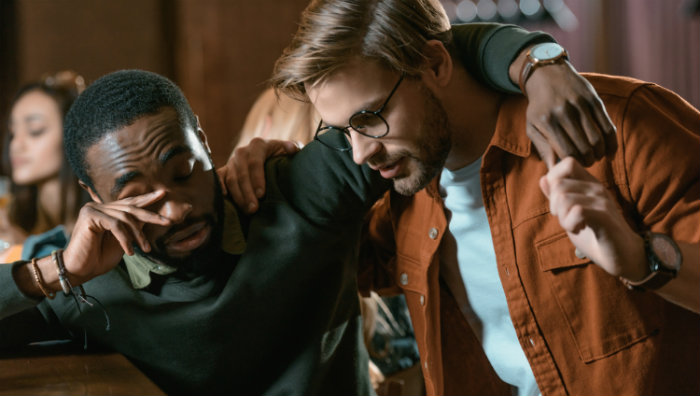When Enough is Enough at the Bar

Getting together with friends, co-workers, and family at a restaurant, bar or tavern can be fun, especially during the holidays or other special times. What may not be so fun is when someone drinks too much, thus becoming visibly intoxicated. Bartenders are responsible for cutting off inebriated customers because they can be liable for over-serving. What you need to know about Dram Shop Law.
Why Visibly Intoxicated Customers Need to be Cut Off
One of the downsides of bartending is having to tell a visibly intoxicated customer that it is time to call it quits for the night.
Letting a visibly intoxicated person continue to drink could lead to:
- Alcohol poisoning is a condition that occurs when alcohol is consumed at very high levels. While the threshold varies for each individual, approximately six people die each day from this condition. (CDC)
- Driving under the influence. The inebriated person could get behind the wheel of a car and cause an accident that seriously injures him/herself or other innocents. Drunk drivers are distracted, unable to concentrate, and drive erratically causing an average of 37 deaths every day. In 2022, there were 13,524 alcohol-impaired driving traffic deaths. (NHTSA)
In most states, bars and similar establishments are liable for over-serving customers. In fact, 38 states (including Missouri) have Dram Shop laws that relate to serving those who are intoxicated. Should a bar continue to serve an intoxicated customer who then causes an accident after leaving, the bar itself could share the liability.
In essence, cutting off drunk customers is not just a policy of the establishment, it is the law.
When you have questions, we are here to help. Call us at (877) 284-6600.
Dram Shop Law
In general, a bar can be liable for over-serving alcohol if the establishment knew or should have known that the customer was so intoxicated that more alcohol would cause danger to him/herself or others.
Critical factors in Missouri dram shop law are
- By the drink
- On the premises
- Proven by clear and convincing evidence and
- Knowingly served intoxicating liquor to a visibly intoxicated person
Be sure to look at your own state’s Dram Shop Law.
 How can a bartender or server know when someone is visibly intoxicated? Signs include but are not limited to:·
How can a bartender or server know when someone is visibly intoxicated? Signs include but are not limited to:·
- Slurring of speech
- Acting confused
- Having trouble standing up or walking
- Bloodshot or glazed eyes
- Negative or aggressive interactions with others
- Overly loud, boisterous, or animated behavior
- Bothering other guests
Tips for Cutting Someone off
- Make sure that your manager, other bartenders, and wait staff know that you are cutting a customer off so that they do not serve the person afterward.
- Suggest that it is time to call it quits for the night. Lean in to speak with the customer so that others don’t hear the conversation. Let him or her know you are not comfortable serving another drink.
- Explain the situation, that s/he has had too much to drink and that you have a legal obligation when it comes to over-serving intoxicated customers. It is as much for his or her safety as it is for everyone else.
- Talk with the person’s friends, those that are with him or her. Make sure that no one buys a drink for the intoxicated person after you have cut them off.
- Be polite, firm, and direct that you will not serve the customer any more drinks. Explain that this is not just a company policy; it is the law. You are responsible for what happens to them after they leave whether it is an injury to that person or another.
- Ask if the person needs transportation and offer to arrange a taxi, Uber or other car service. Ask him to give his car keys to a friend for safekeeping..
- If the person gets violent or aggressive, ask him to leave, call security, or call the police.
HOW CAN WE HELP YOU?
DO YOU NEED LEGAL ASSISTANCE?
Contact the capable counsel you need now. One of our experienced staff will speak with you personally and will provide you with a free, no-obligation case evaluation.
START YOUR FREE CASE EVALUATION TODAY
JUST WANT TO STAY UP-TO-DATE?
SIGN UP FOR OUR EMAIL NEWSLETTER
If you would like to receive news and blog updates regularly, sign up to receive our email newsletter. Your email address will only be used to send you our newsletter and respond to inquiries.
SIGN UP FOR NEWSLETTER
Resources
Past results afford no guarantee of future results and each case is different and is judged on its own merits. The choice of a lawyer is an important decision and should not be based solely upon advertisements.
Editor’s Note: This post was originally published on December 18, 2019. It was reviewed on November 9, 2022, and updated for content and accuracy, and again on December 23, 2024.
Related

 How can a bartender or server know when someone is visibly intoxicated? Signs include but are not limited to:·
How can a bartender or server know when someone is visibly intoxicated? Signs include but are not limited to:·